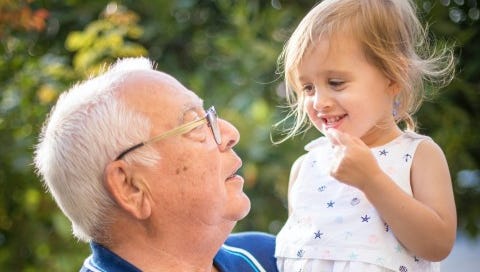Thanks to Kert Lenseigne for suggesting I bring this post to Ss.
A 3-year-old, Max, asks his grandfather, “Why are you an old man?”
Countless children offer keen observations, ask surprising, thoughtful, penetrating questions, filled with curiosity and wonder. As parents, grandparents, teachers and friends, we would do well to seize that opportunity to have a conversation and explore some of the big why’s of life, as we know it.
A child once asked me if I have always been this tall. (I am 6’2”). I smiled, and said, “No, I was once just as tall as you.” A grandchild asked how my feet got so big. (I wear a size 14 shoe.). Terrific questions! They wonder about my size, relative to theirs, and their question is how did you get to be that way? They are trying to make sense of getting older or bigger and wondering how it is going to happen to them. What they cannot grasp is the meaning of change over time. They will understand, eventually, that these things happen to everyone but not always in the same way nor on the same schedule.
We get larger and older in different ways on different timetables until we don’t. We are not all the same. Thank goodness!
Six-year-olds vary from one another in more ways than most people recognize. So do 50-year-olds and 80-year-olds. As the late Ken Robinson opined, “Why should the only thing they have in common be the date of manufacture?” He was referring to why we expect kids to start school at the same age. What is true for all of us, regardless how old or young we are, is that there are many differences regardless of age.
What I know as my reality is not the same as yours. There may be some similarities when we take time to compare. What I have learned about getting bigger and older is that there are bumps along the road, some hardships, suffering and challenges. What I also learned along the way, and helped immensely, was knowing the people who loved me and cared about me beyond what I would have imagined. In that process, I also learned how to love others and care about them in ways I could not have known about when this all started.
Becoming who we are is a lifelong process and experience. Having just passed another birthday, I reflect on my reality of living long and well. I recall Margery Williams’ book, “The Velveteen Rabbit” and her illustration of becoming real. Here’s the excerpt that explains it better than I can.
"What is REAL?" asked the Rabbit one day, when they were lying side by side near the nursery fender, before Nana came to tidy the room. "Does it mean having things that buzz inside you and a stick-out handle?"
"Real isn't how you are made," said the Skin Horse. "It's a thing that happens to you. When a child loves you for a long, long time, not just to play with, but REALLY loves you, then you become Real."
"Does it hurt?" asked the Rabbit.
"Sometimes," said the Skin Horse, for he was always truthful. "When you are Real you don't mind being hurt."
"Does it happen all at once, like being wound up," he asked, "or bit by bit?"
"It doesn't happen all at once," said the Skin Horse. "You become. It takes a long time. That's why it doesn't happen often to people who break easily, or have sharp edges, or who have to be carefully kept. Generally, by the time you are Real, most of your hair has been loved off, and your eyes drop out and you get loose in the joints and very shabby. But these things don't matter at all, because once you are Real you can't be ugly, except to people who don't understand."
"I suppose you are real?" said the Rabbit. And then he wished he had not said it, for he thought the Skin Horse might be sensitive. But the Skin Horse only smiled.
"The Boy's Uncle made me Real," he said. "That was a great many years ago; but once you are Real you can't become unreal again. It lasts for always."
As for aging, there is compelling evidence in a study which I have cited previously, the Harvard Longitudinal Study. It followed 268 Harvard educated men still living now in their nineties. The study is now expanding to include wives and children of those graduates. What this 80-year-long study reveals, among other things, is that close relationships, more than money or fame, are what keep people happy throughout their lives. Those ties protect us from life’s discontents, help to delay mental and physical decline, and are better predictors of long and happy lives than social class, IQ, or even genes.
So, my friends, what is important are our connections and relationships with one another and there you have it. Family and community, neighbors and friends, our wonderfully diverse and shared humanity. Let’s find more ways to celebrate that!
Max and all the other kids want to know how we got to be old and this is how. Let’s tell them the stories of how we got old by loving and being loved. Oh, yes, and be sure to tell them we love them and their questions.




Your words brought back so many open, honest questions my students would ask me when I was teaching first grade. I had to get used to it my first year of teaching when I had just turned 22 years old; some of their questions caught me off guard. But then I became accustomed to it and loved their curiosity accompanied by their innocence. Out of the mouths of babes, as they say!
Love this and love "The Velveteen Rabbit". I've been known to cry when reading it. Thanks for sharing. 💜